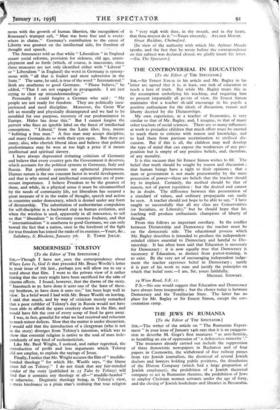THE CONTROVERSIAL IN EDUCATION
[To the Editor of THE SPECTATOR.] SIR,—Sir Ernest Simon in his article and Mr. Bagley in his • letter are agreed that it is, at least, one task of education to teach a love of truth. But while Mr. Bagley treats this as the assumption underlying his teaching, and requiring him to present impartially all points of view, Sir Ernest Simon maintains that a teacher should encourage in his pupils a positive enthusiasm for the ideals of discussion, reason and liberty decried by the Dictatorships.
My own experience, as a teacher of Economics, is very similar to that of Mr. Bagley, and, I imagine, to that of many other teachers of social sciences. There are so many influences at work to prejudice children that much effort must be exerted to teach them to criticise with reason and knowledge, and to lead them from partisan recrimination to civilised dis- cussion. But if this is all, the children may well develop the type of mind that can expose the weaknesses of any pro- position but is empty of any positive beliefs, and, therefore, of any morality.
It is this vacuum that Sir Ernest Simon wishes to fill. The belief that truth should be sought by reason and discussion ; that human beings have a right to their opinions ; that a man or government is not made praiseworthy by the mere possession of power—these are beliefs that the teacher should try to implant. Certainly, the method should be that of reason, not of parrot repetition : but the desired end cannot be in doubt. The difference between this presentation of a standard of values, and ordinary propaganda can easily be seen. A teacher should not hope to be able to say, " I have taught so successfully that all my class are Conservatives (or Socialists, or Liberals)," but he should hope that his teaching will produce enthusiastic champions of liberty of thought.
From this follows an important corollary. In the conflict between Dictatorship and Democracy the teacher must be on the democratic side. The educational process which Mr. Bagley describes is intended to produce the independent- minded citizen essential to Democracy and hateful to Dic- tatorship. It has often been said that Education is necessary for Democracy : it is now equally true that Democracy is necessary if Education, as distinct from parrot-training, is to exist. By the very act of encouraging independent judge- ment the teacher expresses belief in Democracy ; surely it is part of his work to state and justify the principles on which that belief rests.—I am, Sir, yours faithfully, P.S.—No one would suggest that Education and Democracy have always been inseparable ; but the choice today is between Democracy and the Totalitarian State. The latter has no place for Mr. Bagley or Sir Ernest Simon, except the con- centration camp.














































 Previous page
Previous page